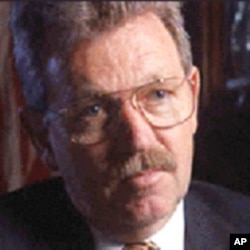Iran's chief nuclear negotiator Saeed Jalili says his country is not willing to bargain over its nuclear rights in the next round of talks in Turkey.
At a Tuesday news conference in Geneva, he said Iran will not discuss halting its uranium enrichment with six world powers at a January meeting in Istanbul. He commented shortly after Tehran wrapped up two days of talks with representatives of the five permanent U.N. Security Council and Germany, a group known as the P5+1.
Iran is suspected to be pursuing uranium enrichment for the purpose of acquiring nuclear weapons.
Asked by VOA’s Susan Yackee to assess the Geneva talks, David Kay, a senior research fellow at the Potomac Institute for Policy Studies, said what the negotiations are lacking is clarity in terms of what the West is demanding.
“Quite clearly, the United States would prefer that the [uranium] enrichment program was completely abandoned, that Iran would restrict itself to its nuclear power plants, not carry through on its heavy-water reactor. But those things are not likely to happen. So the West has to decide on what is essential.”
|
Listen to the full interview with David Kay:
|
Kay believes inspections and safeguarding might be a more realistic approach considering that Iran will not accept any demands to completely abandon uranium enrichment or plutonium-producing heavy-water reactors.
As for whether the West has any leverage, Kay does believe that existing sanctions have brought results by creating some internal dissension in Iran in terms of the nuclear program’s value if measured against its economic cost.
Should Iran decide to keep the program going regardless of cost, Kay acknowledges that there is little the West can do to stop it, short of taking military action. Asked what a military action would entail, Kay said that it is the unpredictability of the repercussions of such an action that presents an obstacle to anyone considering a military campaign. “What the consequences of that would be, not only for Iran, but for the region and for the United States is not at all clear,” added he.
Kay does believe that engaging Iran in continued talks on the issue is not only useful, but necessary. Even the Iranians, says he, love to talk and to negotiate, but Kay is convinced that for them it is a tactic aimed at wearing down their opponent’s urge to continue sanctions or embark on tougher measures.




